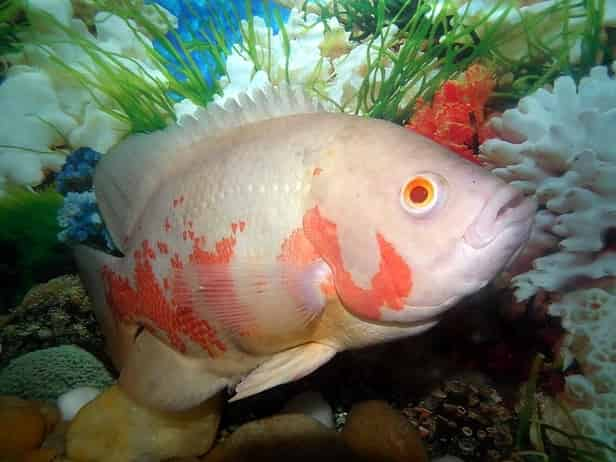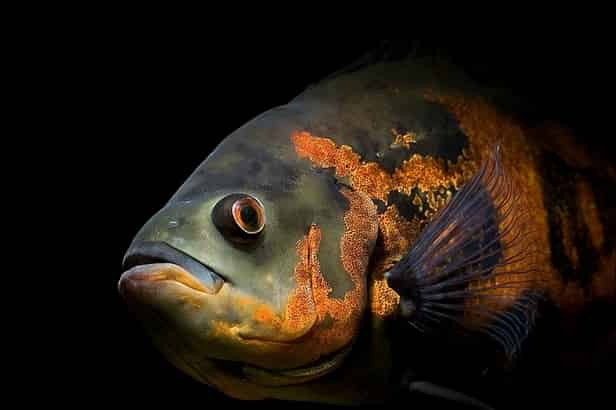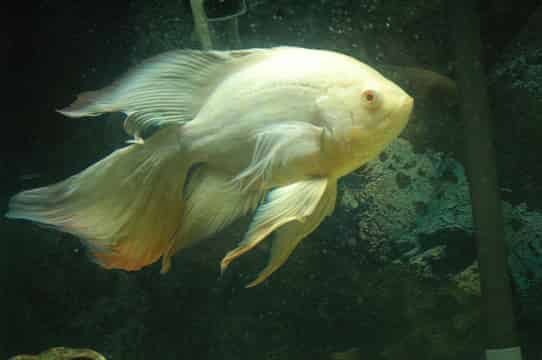Oscar
The Oscar Cichlid, or otherwise
known as "Oscar fish", have been one of the most favorite species of
cichlids considered for petting because they are fun to keep and are friendly
to their owners. They could easily recognize their owners and be aware
They are natives to the different
rivers of South America, specifically from the waterways of Peru , Brazil French Guiana . But before going out to
purchase one for a pet, there are important things to know about Oscar Cichlids
that you need to consider.
Enthusiasts planning to raise Oscar
Cichlids should prepare a large tank, spacious enough to accommodate the
immediate growth of this kind
However, be sure to make use of the
rounded kind since these types of fish are inclined Furthermore, there be considered
Hobbyists who are obsessed tend to be
Feeding can be an exciting
experience since Oscars interact whenever they are fed they will be fed
Owners should also understand that
Oscars are temperamental. This is the reason why are considered to have be bothered jolly
Enthusiasts need to be aware oftentimes They can be seen mouth actually
Oscars may also be
observed
They might just think that their
reflections are another fish trying to get in their territories. Oscars, like
most cichlids, are territorial. They need to be accustomed why in some cases it is
suggested that be bred the
former to be accustomed
Breeders should also take note that
in most cases, it is hard to distinguish a male from a female Oscars indication begins to be
Other fish in the tank should be
taken is observed they are considered It is advised generally fry
Since Oscar Cichlids, or Oscar Fish,
are expected up Nevertheless, the are oftentimes referred
Oscar Cichlid, also known for their
scientific name Astronomus Ocellatus is found Peru , Brazil ,
French Guiana and Columbia
Other names include Velvet Cichlid, Marbled Cichlid, and Tiger Oscar. These fish are rapid growers. Reaching an average of 12 inches in length some have been
known a total of are found they are known are striped
Other names include Velvet Cichlid, Marbled Cichlid, and Tiger Oscar. These fish are rapid growers. Reaching an average of 12 inches
Oscars are carnivores, their diet
should consist of High quality prepared foods such as
pellets and flakes can also be supplemented
A 75-gallon tank per Oscar is the
ideal size with a water temperature range of 70-80 degrees Fahrenheit. PH
should be maintained water conditions must be kept
Oscar cichlid breeding
If keeping Oscars, it is necessary to
have a large tank as they grow to a considerable size when mature. They are
often known the
They are rather a messy fish and
like to dig up plants and stir up the tank decorations, so heavier items that
are more difficult to move are the best if you don't what the tank continually
rearranged. While this behavior can be quite be annoying
Oscars do not show any discernible
differences between the sexes, so getting a breeding pair may be quite
The best method is to raise a group of individuals together, and if you have six, there is a fair likelihood of getting at least one pair. They will bond for life with their chosen mate.
The best method is to raise a group of individuals together, and if you have six, there is a fair likelihood of getting at least one pair. They will bond for life with their chosen mate.
Breeding Oscars is considered very clean
When ready, the process of be aware
The batch of eggs can number up to a
thousand. A number of the totally they are attached free-swimming be
fed
Oscar fish care
Oscar
cichlid of all species has become more and more popular over recent years. The
reason for this is that they
are really suited Generally, they sort
of
An important aspect of Oscar cichlid care is the correct
diet for your fish. There needs to be sufficient variety on their diet to
ensure that they remain healthy. This variety comes from live food, frozen
food, flakes, and pellets. Food should be given
There are many species of Oscar cichlid. Some
species are carnivorous and feed on live food almost exclusively indeed
Water temperature is another key factor in ensuring a
healthy aquarium. The correct temperature should be between 74 and 82 degrees
Fahrenheit. It is important to keep the water temperature constant. Oscar
cichlid dislikes fluctuations in water temperature. Fortunately, this should
not be a problem, as most tank heaters can be set
Oscar cichlid prefer alkaline water. This is in the region
of
Your tank should have a filter that is of the correct size
and power for the size of your tank. A filter that is not powerful enough will
not be able to oscar
You need to try to
Oscar fish buying
There are diversities of Oscar cichlid that are readily
found
Is it a good choice to buy Oscar cichlid online?
Buying online could be risky. There are various precautions
that need to be considered
• Make sure that the site chosen is a trusted source. There
are reviews that may be pondered
• Be certain to emphasize the color and type of Oscar
cichlid preferred. Be specific and make sure that they deliver the right one as
per specification and preference.
• It may be hard to determine whether the fish ordered is
disease free because of the lack of opportunity to see the fish physically and
observed if the fishers are fed
• It is important to find out first if the site offers a
good return policy before buying the Oscar cichlid online.
• The disadvantage of online purchasing is that there is no
chance for the hobbyist to have a personal interaction with the employees who
Is buying Oscar cichlid in the local store better?
It may be beneficial and advantageous basically does not know anything whatsoever when it comes to Nonetheless, there buy
• The first advantage is that aquarists have the opportunity
to whether the fish is healthy or
not
• Buying in local stores gives collectors the chance to pick
what they really want from the color to type or variety, to the number of
Oscar cichlid opted in buying.
• And last, there is no shipping required, thus no chance
of putting the fish into risk while in transport.
Making the choice may not be easy especially when one is
left have a chance to be trusted
Oscar fish diet
The best cichlid food today has come a long way from the
selections open to the public before. Well, I have always been a
traditionalist. I believe that organic or natural food should be given Nevertheless, there that is
But before dwelling on that, let me discuss first the types
of eater in general They can be classified consist of the combination of fish flakes, live food, and
vegetables. Some examples of this omnivorous Oscar cichlid are the Petrochromis
The second type is the carnivorous type. These types are
those that eat mainly organisms such as insects, insect larvae, shrimp,
crustaceans, worms, and fish eggs. But they also have the tendency to eat
smaller fishes in the tank, making them perfect predators. Crenicichla oscar Haplochromines
During spawning, it is best to provide protein-rich food for
your breeding Oscar cichlid. Their fry can be fed There are times that
The debate on which food is better is something that most
breeders consider. they are processed are identified are encapsulated Vitamin C, amino acid,
spirulina, carotene and other food supplements needed by the fish. However,
organic foods are better because they possess the natural nutrients that
provide healthier benefits to your pets. Though finding live foods can be
harder as compared you are assured
The best cichlid food is not determined whatever is served
https://www.exoticpetslovers.xyz/2019/10/koi-carb.html






